Egusi
Egusi (Yoruba: ẹ̀gúsí, igbo: ègwụsị), also known as agusi, ohue, Ikpan, Ikon, agushi or mbíka) // ⓘ is the name for the protein-rich seeds of certain cucurbitaceous plants (squash, melon, gourd), which, after being dried and ground, are used as a major ingredient in West African cuisine.[1][2][3]
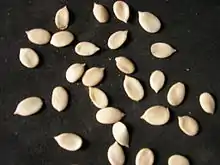
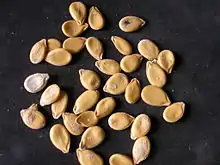
Egusi melon seeds are large and white in appearance; sometimes they look brownish in color but the main egusi color is white.[4]
Scholars disagree whether the word is used more properly for the seeds of the colocynth, those of a particular large-seeded variety of the watermelon, or generically for those of any cucurbitaceous plant.[5] Egusi seeds are in a class of their own and should never be mistaken for pumpkin or watermelon seeds. In particular the name "egusi" may refer to either or both plants (or more generically to other cucurbits) in their capacity as seed crops, or to a soup made from these seeds and popular in West Africa.[6]
The characteristics and uses of all these seeds are broadly similar. Major egusi-growing nations include Nigeria, Burkina Faso, Togo, Ghana, Côte d'Ivoire, Benin, Mali, and Cameroon.[5]
Species from which egusi is derived include Cucumeropsis mannii and Citrullus lanatus.[7]
Usage
Egusi soup is a soup thickened with the seeds. Egusi soup is popular in West Africa, with considerable local variations.[8] Besides the seeds, water, and oil, egusi soup typically contains leaf vegetables, palm oil, other vegetables, seasonings, and meat,[9]. Leaf vegetables typically used for egusi soup include bitterleaf, pumpkin leaf, celosia and spinach. Typical other vegetables include tomatoes and okra. Typical seasonings include chili peppers, onions, and locust beans. Also commonly used are beef, goat, fish, shrimp, or crayfish.
In Nigeria, egusi is common among the people of the eastern, southern and western part of Nigeria.[10]
In Ghana, egusi is also called akatoa or agushi, and is used for soup and stew,[11] most popularly in palaver sauce.[12]
In the late 1980s, the Government of Canada funded a project intended to develop a machine to help Cameroonians shell egusi seeds.[13] A machine has also been developed in Nigeria to shell egusi.[14]
Gallery
_served_in_Birmingham_UK.JPG.webp) A plate of pounded yam, and egusi soup
A plate of pounded yam, and egusi soup Pounded yam, and egusi soup served with fish
Pounded yam, and egusi soup served with fish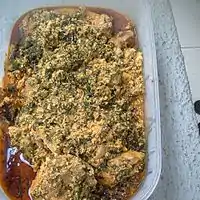 Egusi and bitter leaf soup
Egusi and bitter leaf soup.jpg.webp) Egusi powder with powdered lemon
Egusi powder with powdered lemon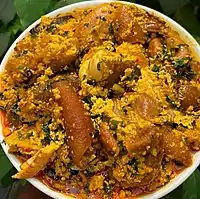 Egusi soup with ponmo and beef
Egusi soup with ponmo and beef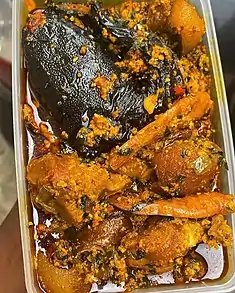 Egusi soup with vegetables and dried catfish, prawns, beef and roasted cowskin
Egusi soup with vegetables and dried catfish, prawns, beef and roasted cowskin
See also
References
- Rachel C. J. Massaquoi, "Groundnut, Egusi, Palm Oil, and Other Soups", in Foods of Sierra Leone and Other West African Countries: A Cookbook, AuthorHouse, 2011, p. 36.
- Ukegbu, Kavachi Michelle (2021). The art of fufu : a guide to the culture and flavors of a West African tradition. Grubido. Austin, Texas. ISBN 978-1-62634-596-6. OCLC 1241244901.
{{cite book}}: CS1 maint: location missing publisher (link) - Africa, Demand (June 20, 2017). "How to Make Nigerian Egusi Soup Recipe | Egusi Soup Recipes".
- National Research Council (U.S.). Board on Science and Technology for International Development (2006). Lost crops of Africa. Volume II, Vegetables. Washington, D.C.: National Academies Press. ISBN 978-0-309-66582-7. OCLC 85851965.
- National Research Council (2006). "Egusi". Lost Crops of Africa: Volume II: Vegetables. National Academies Press. pp. 158 (155–171).
- Aninkan, Anjola S.; Makinde, Eyitayo A. (2021-08-23). "Fertilizer Rate for Optimum Growth and Yield of Egusi Melon (Colocynthis citrullus L.)/ Hot Pepper (Capsicum chinense, Jackquin cv. rodo) Intercrop". 5th International Students Science Congress. Izmir International Guest Student Association. doi:10.52460/issc.2021.005. ISBN 9786057073723. S2CID 238738395.
- Blench, Roger (2006). Archaeology, language, and the African past. Altamira Press. ISBN 9780759104655.
- Badiru, I. & Badiru, D. (2013). Isi Cookbook: Collection of Easy Nigerian Recipes. Bloomington: iUniverse. p. 36. ISBN 9781475976717.
- Okwanma, Robin. "Egusi Soup: Ingredients". CYBER NG. Robin Okwanma. Retrieved 22 November 2022.
- "Egusi Soup: A Royal Feast For Any Day". Google Arts & Culture. Retrieved 2023-02-08.
- "13 Nigerian Foods That Are Eaten By Ghanaians But Have Different Names" Archived 2016-11-27 at the Wayback Machine, OMGVoice.
- Freda Muyambo, "Palaver Sauce Recipe", About food.
- "Projects in Cameroon". Archived from the original on 2014-11-27.
- Shittu, S. K. & Ndrika, V. I. O. (2012). "Development and performance tests of a melon (egusi) seed shelling machine". Agricultural Engineering International: CIGR Journal.
- Olubi, O.; Felix-Minnaar, J.V.; Jideani, V.A. (January 2019). "Physicochemical and fatty acid profile of egusi oil from supercritical carbon dioxide extraction". Heliyon. 5 (1): e01083. Bibcode:2019Heliy...501083O. doi:10.1016/j.heliyon.2018.e01083. PMC 6313835. PMID 30619961.
- Harnik, Erika; Jama, Zainab; Kwok, Matthew; Fox, Adam T.; Santos, Alexandra F. (January 2022). Riggioni, Carmen (ed.). "Egusi seed allergy confirmed using the basophil activation test". Pediatric Allergy and Immunology. 33 (1): e13716. doi:10.1111/pai.13716. ISSN 0905-6157. PMID 34927761. S2CID 245334033.
